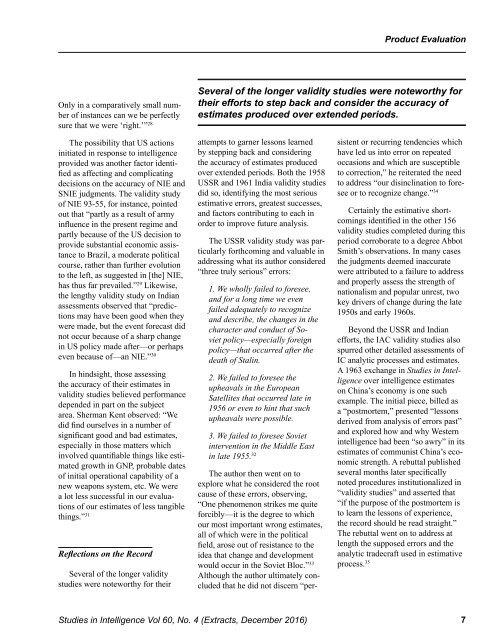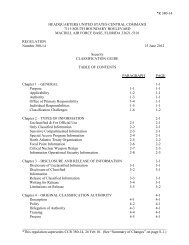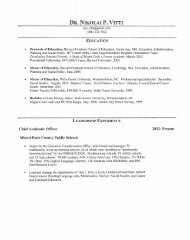extracts-studies-dec-2016
extracts-studies-dec-2016
extracts-studies-dec-2016
Create successful ePaper yourself
Turn your PDF publications into a flip-book with our unique Google optimized e-Paper software.
<br />
Product Evaluation<br />
Only in a comparatively small number<br />
of instances can we be perfectly<br />
sure that we were ‘right.’” 28<br />
Several of the longer validity <strong>studies</strong> were noteworthy for<br />
their efforts to step back and consider the accuracy of<br />
estimates produced over extended periods.<br />
The possibility that US actions<br />
initiated in response to intelligence<br />
provided was another factor identified<br />
as affecting and complicating<br />
<strong>dec</strong>isions on the accuracy of NIE and<br />
SNIE judgments. The validity study<br />
of NIE 93-55, for instance, pointed<br />
out that “partly as a result of army<br />
influence in the present regime and<br />
partly because of the US <strong>dec</strong>ision to<br />
provide substantial economic assistance<br />
to Brazil, a moderate political<br />
course, rather than further evolution<br />
to the left, as suggested in [the] NIE,<br />
has thus far prevailed.” 29 Likewise,<br />
the lengthy validity study on Indian<br />
assessments observed that “predictions<br />
may have been good when they<br />
were made, but the event forecast did<br />
not occur because of a sharp change<br />
in US policy made after—or perhaps<br />
even because of—an NIE.” 30<br />
In hindsight, those assessing<br />
the accuracy of their estimates in<br />
validity <strong>studies</strong> believed performance<br />
depended in part on the subject<br />
area. Sherman Kent observed: “We<br />
did find ourselves in a number of<br />
significant good and bad estimates,<br />
especially in those matters which<br />
involved quantifiable things like estimated<br />
growth in GNP, probable dates<br />
of initial operational capability of a<br />
new weapons system, etc. We were<br />
a lot less successful in our evaluations<br />
of our estimates of less tangible<br />
things.” 31<br />
Reflections on the Record<br />
Several of the longer validity<br />
<strong>studies</strong> were noteworthy for their<br />
attempts to garner lessons learned<br />
by stepping back and considering<br />
the accuracy of estimates produced<br />
over extended periods. Both the 1958<br />
USSR and 1961 India validity <strong>studies</strong><br />
did so, identifying the most serious<br />
estimative errors, greatest successes,<br />
and factors contributing to each in<br />
order to improve future analysis.<br />
The USSR validity study was particularly<br />
forthcoming and valuable in<br />
addressing what its author considered<br />
“three truly serious” errors:<br />
1. We wholly failed to foresee,<br />
and for a long time we even<br />
failed adequately to recognize<br />
and describe, the changes in the<br />
character and conduct of Soviet<br />
policy—especially foreign<br />
policy—that occurred after the<br />
death of Stalin.<br />
2. We failed to foresee the<br />
upheavals in the European<br />
Satellites that occurred late in<br />
1956 or even to hint that such<br />
upheavals were possible.<br />
3. We failed to foresee Soviet<br />
intervention in the Middle East<br />
in late 1955. 32<br />
The author then went on to<br />
explore what he considered the root<br />
cause of these errors, observing,<br />
“One phenomenon strikes me quite<br />
forcibly—it is the degree to which<br />
our most important wrong estimates,<br />
all of which were in the political<br />
field, arose out of resistance to the<br />
idea that change and development<br />
would occur in the Soviet Bloc.” 33<br />
Although the author ultimately concluded<br />
that he did not discern “persistent<br />
or recurring tendencies which<br />
have led us into error on repeated<br />
occasions and which are susceptible<br />
to correction,” he reiterated the need<br />
to address “our disinclination to foresee<br />
or to recognize change.” 34<br />
Certainly the estimative shortcomings<br />
identified in the other 156<br />
validity <strong>studies</strong> completed during this<br />
period corroborate to a degree Abbot<br />
Smith’s observations. In many cases<br />
the judgments deemed inaccurate<br />
were attributed to a failure to address<br />
and properly assess the strength of<br />
nationalism and popular unrest, two<br />
key drivers of change during the late<br />
1950s and early 1960s.<br />
Beyond the USSR and Indian<br />
efforts, the IAC validity <strong>studies</strong> also<br />
spurred other detailed assessments of<br />
IC analytic processes and estimates.<br />
A 1963 exchange in Studies in Intelligence<br />
over intelligence estimates<br />
on China’s economy is one such<br />
example. The initial piece, billed as<br />
a “postmortem,” presented “lessons<br />
derived from analysis of errors past”<br />
and explored how and why Western<br />
intelligence had been “so awry” in its<br />
estimates of communist China’s economic<br />
strength. A rebuttal published<br />
several months later specifically<br />
noted procedures institutionalized in<br />
“validity <strong>studies</strong>” and asserted that<br />
“if the purpose of the postmortem is<br />
to learn the lessons of experience,<br />
the record should be read straight.”<br />
The rebuttal went on to address at<br />
length the supposed errors and the<br />
analytic tra<strong>dec</strong>raft used in estimative<br />
process. 35<br />
Studies in Intelligence Vol 60, No. 4 (Extracts, December <strong>2016</strong>) 7




